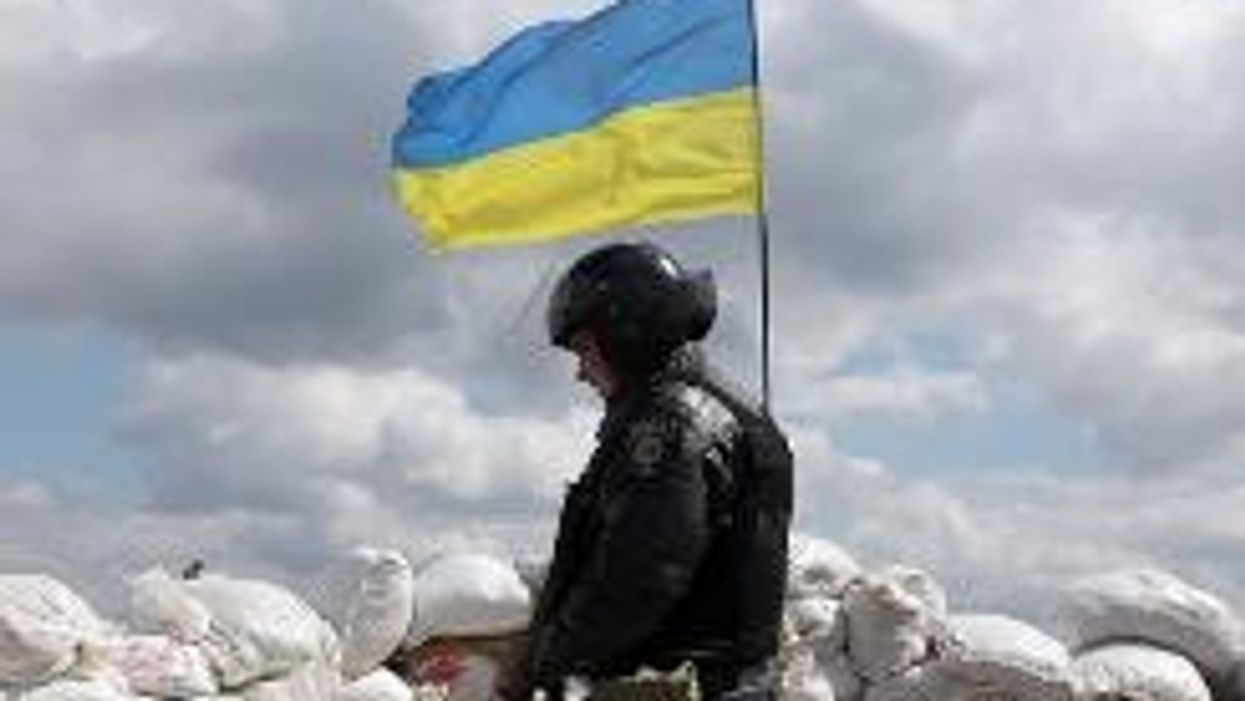
A Ukrainian Army soldier on duty
In a properly-run dictatorship, Dear Leader always wins thunderous electoral victories. You won’t see Vladimir Putin in any late-night cliffhangers. Regardless of how many of his political opponents fall out of windows, get shot dead in the street, find neurotoxins in their underwear, or get thrown into prison—or, in the case of Putin’s outspoken critic Alexi Navalny, both—the Little Tsar’s faithful supporters can be depended upon to keep cheering.
Or, at minimum, to avert their eyes.
The awful truth, you see, is that under the right circumstances, Fascism can be very popular. Most people are instinctively nationalistic, and Putin’s basic message of “Make Russia Great Again,” as Kevin Drum puts it, can be counted upon to resonate. So long, that is, as the Little Tsar maintains complete control of Russian media and prevents foreign news from filtering into the country.
Last year, the Russian military outlawed the possession of Smartphones by soldiers. Last week, Margaret Sullivan reports, its parliament banned the words “war,” “invasion” and “attacks” from being used to describe Russia’s assault upon Ukraine. Instead, it’s called a “special military action,” supposedly to protect Russian-speaking UkraInians from their “Nazi” oppressors.
Ukraine’s defiant President Volodymyr Zelensky, of course, is a Jew, which makes the lie particularly grotesque. But then sheer audacity is often the key to effective propaganda.
Inside Russia, reporting and publishing “fake news,” a phrase borrowed from Putin’s biggest American fan, Donald J. Trump, is now a criminal offense, punishable by 15 years in prison. Moscow, police have been reported spot-checking people’s cellphones on the street, hunting for dissenters. Western news organizations such as the BBC, CNN, and the Washington Post have quietly quit sending bylined dispatches from inside Russia lest their reporters get thrown into dungeons.
Even Fox News, where the pro-Putin cheerleading stopped only last week, and whose brand-name personalities Tucker Carlson and Laura Ingraham had become regular fixtures on Russian state TV, no longer reports direct from Moscow. It’s too dangerous.
Russia has banned Facebook and Twitter.
And, yes, it’s certainly working. Wave the flag, beat the drum and report only thunderous victories over fiendish enemies—"Oceania was at war with Eurasia; therefore Oceania had always been at war with Eurasia,” Orwell wrote in “Nineteen Eighty-Four”—and the great majority will support the Little Tsar for as long as the illusion survives.
The ”Two Minutes Hate” is always well-attended.
An extraordinary report in the New York Times documents the stunning experiences of besieged Ukrainians trying vainly to make their Russian relatives understand what’s going on. Instead, they encounter “a confounding and almost surreal backlash from family members in Russia, who refuse to believe that Russian soldiers could bomb innocent people, or even that a war is taking place.”
Reporter Valerie Hopkins interviewed Misha Katsurin, a Ukrainian restaurateur, who phoned his Russian father to describe his efforts to evacuate his wife and children. Instead of sympathy, he got yelled at for siding with Nazis.
Far from bombarding Ukrainian cities and villages, the older man insisted, Russian soldiers are handing out blankets and food to victims of Nazi atrocities. His son’s eyewitness accounts counted for less than state TV propaganda—where Russian artillery barrages are definitely not targeting civilian neighborhoods. Also, there’s certainly no 40-mile-long tank convoy stalled impotently on a Ukrainian highway, a show of military incompetence that has astonished observers worldwide.
One couple told The Times it was “easier to explain the invasion to their 7-year-old daughter than to some of their [Russian} relatives.” For his part, Misha Katsurin says “I am not angry at my father — I am angry at the Kremlin. I’m angry about the Russian propaganda. I’m not angry at these people. I understand that I cannot blame them in this situation.”
Problem is, the Little Tsar can’t keep Russians in the dark forever. As the coffins of Russian soldiers begin to come home, and embittered soldiers start telling their war stories at family gatherings and in bars, the awful truth will begin to emerge.
Historically speaking, Russians have had a lot of bitter experience decoding government propaganda. Under the Soviet Union, the nation’s two leading newspapers were Pravda (truth) and Izvestia (news).
Russians told a bitter joke that became proverbial: “There is no truth in news and no news in truth.”
So, yes, the Russian people have seen this movie before. Which could very well be, come to think of it, why Vladimir Putin has resorted to crazy talk about nuclear weapons. Isolated from the outside world and surrounded by the worst kinds of sycophants and yes-men, it may be dawning upon him what a terrible trap he’s set for himself and for Russia.
Invading Ukraine was supposed to weaken NATO and divide America from Europe. Instead, it’s made the Western democracies more united than ever. The hard part will be finding the Little Tsar a survivable way out
- Today's Republican Party Emits Sinister Echoes Of 'America First ... ›
- Mimicking GOP, Putin's Spy Chief Whines About Cancel Culture ... ›
- Busted For Supporting Russia, Tucker Carlson Lies Again - National ... ›
- Vladimir Putin Should 'Denazify' Himself - National Memo ›
- Danziger Draws - National Memo ›
- How Putin's 'denazification' claim distorts history, according to ... ›
- Some conservative Catholics' apologies for Putin reveal fascist ... ›
- Putin's Russia as a fascist political system - ScienceDirect ›
- Ivan Ilyin, Putin's Philosopher of Russian Fascism | by Timothy ... ›
- Is Putin's Russia Fascist? - Atlantic Council ›







